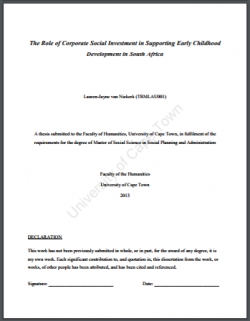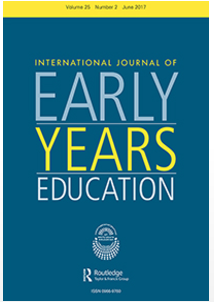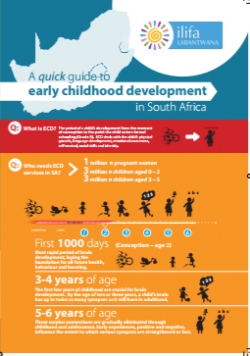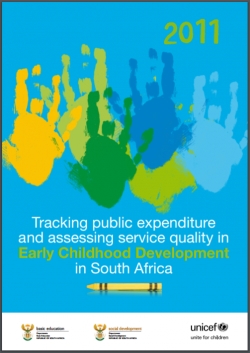How stakeholders politics shape the trajectory of early childhood development policy: a South African case

Type
Thesis
Authors
Category
ECCE, Foundation
[ Browse Items ]
Publication Year
207
Publisher
University of Pretoria, Pretoria, South Africa
Pages
p.
Subject
Early childhood development, Early childhood education, Stakeholders, Government policy, Legislation, Government role, Participation, Consultation, South Africa
Tags
Abstract
This study provides an analysis of how Early Childhood Development (ECD) stakeholders participated in the education policy processes in the country, with the emphasis on the development of White Paper 5 for Early Childhood Education (ECE) policy in South Africa. The policy was the first ever early education policy in South Africa. Early Childhood Development in this study is used as the general term for all aspects of childhood development and growth, in the years between birth to nine. Early childhood Education is specific to the education component of ECD. The policy position called White Paper 5 was a culmination of new education policy processes, which started in the late 1980s and early 1990s in anticipation of the post apartheid government. At the centre of this policy process were ECD stakeholders who played a pivotal role in initiating and exploring ECE policy options for a new South African dispensation. This study traces the role that stakeholders played in the ECE policy processes from the time that they managed to place ECE as a policy concern on the agenda of the National Education Coordination Committees policy forums from 1990 to 1994, when other ECE policy developments started that led to the establishment of the first Directorate for ECD in the Education Department and eventually the production of White Paper 5. The principles of participation and consultation, upon which the political struggles for new policies were built, were taken seriously, into the post-apartheid era from the 1990s to 2000. However, consultation and participation became, more rare as the new government structures started taking on stakeholder roles in the development of ECE and in ECD in general. This was starkly demonstrated when government decided to finalise White Paper 5 for ECE without the direct involvement of the ECD stakeholders. The study shows that the ECD stakeholders did not anticipate or prepare themselves for a different role in the new democratic South Africa, in which government priorities would shift from consulting stakeholders and forging partnerships to delivering on political mandates under, constraints of time and resource. The study also asserts that the role of stakeholders and their participation in the ECE policy processes between 1990 and 2000 played a crucial role in the development and production of White Paper 5, thus stakeholders participated in and influenced the development of the first ever landmark policy on ECE in the country
Number of Copies
1
| Library | Accession No | Call No | Copy No | Edition | Location | Availability |
|---|---|---|---|---|---|---|
| Main | 178 | 1 | Yes |




